Ever wondered what life as a surf instructor is really like? Dreamed about upping sticks and making the move but unsure whether it’s a sustainable career?
We put some questions to riders from our previous instructor courses who are now working in the surf industry and making a living doing what they love. Have a read to find out some key info that will help make up your mind and inspire you to take the leap!
Where are you working now?
Dylan: The Wave, Bristol, UK
Esmee: Ripstar Surf Camp, Netherlands
Laura: Latas Surf Camp, Spain
Miranda: Ticket to Ride Surf School, Watergate Bay, UK
Eva: TBC but has previously worked in the Maldives, Portugal and Wavesisters, Lanzarote
Jimmy: Surf’s Cool! Netherlands
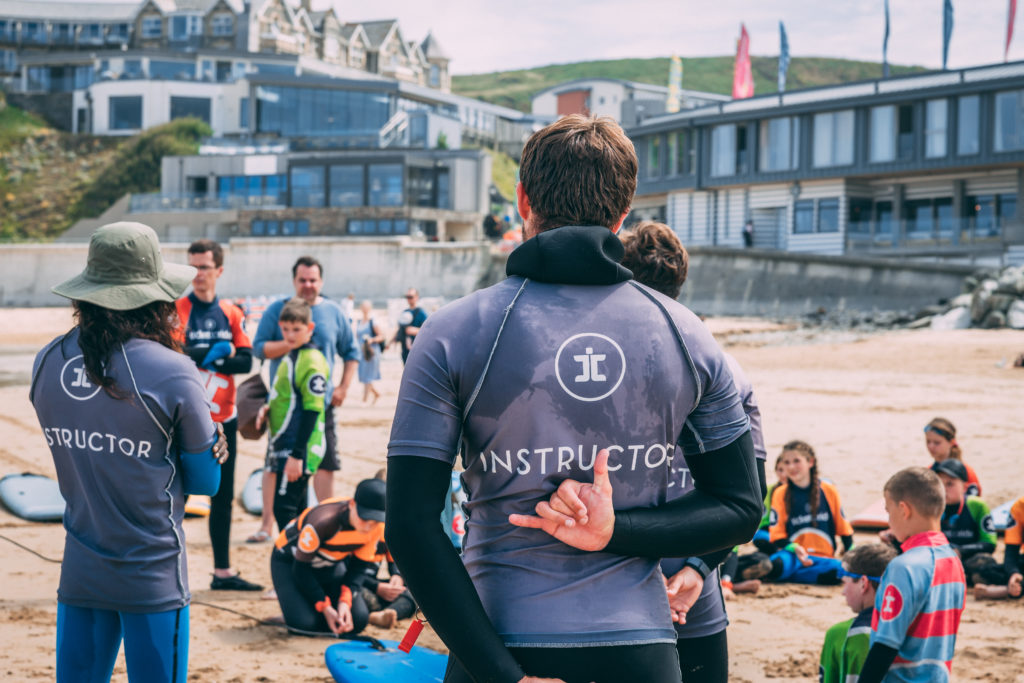
Good vibes at the Ticket to Ride Surf School, Watergate Bay
How did you find this job?
Dylan: I applied online. I went to the Wave before going out to Sri Lanka and they said they are hiring coaches all year round. I applied while out in Sri Lanka and didn’t hear anything back for a long time. I chased them up and eventually spoke to the head of surf recruitment, they liked my proactiveness so said they’d send over a job offer. Another week and a half later and I still hadn’t heard anything so I went in person again and finally they sent me a job offer!
Esmee: I saw a story on Instagram and filled out an online application
Laura: I talked to Max from Ticket to Ride after my Sri Lanka instructor course and he emailed a few Surf Schools in Spain and Portugal where he knew the owners. This one texted back immediately saying that they could use another instructor for the season. We did a job interview and after that I had the job!
Miranda: I participated in a 10 week surf instructor course and adventure with Ticket to Ride in Sri Lanka. I stayed on after the trip and did some coaching for TTR out there before returning to the UK.
Eva: I found all these jobs at beachjobs.co The funny part is that I found out about this webpage from one of my students when I did my 20 shadowing hours in Bali. We are still friends and she visited me in Hungary at my home and now she wants to be a surf instructor, too!
Jimmy: As soon as I started surfing I realised coaching is needed for progression so I began attending weekly classes for a year to improve at a surf school in the Netherlands. I became friends with the team and when they heard I got my qualification they asked me to come work with them in the summer.
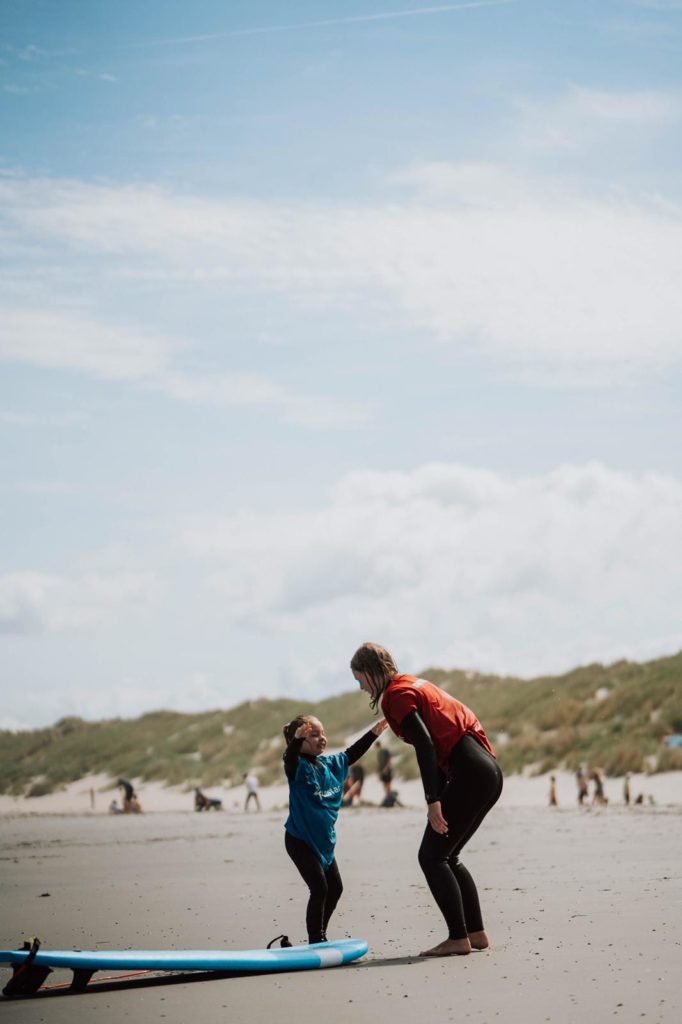
Esmee in action coaching in the Netherlands
How good at surfing do you need to be?
The official ISA guidelines are as follows:
- Paddle out back (beyond the white water)
- Negotiate the impact zone safely (using turtle rolls/duck diving)
- Take off on an unbroken wave
- Perform a basic bottom turn to the left and right
- Ride along the wave both left and right (forehand and backhand)
- Dismount safely demonstrating control
- Return safely to shore
- Surfers must catch four waves, two lefts and two rights
Read on to see what our riders have to say:
Dylan: Not very good! At the Wave if you are teaching beginners you’ll be in knee depth water the whole time. So long as you can demonstrate a good pop-up and have good knowledge you’ll be fine.
Esmee: In March I went to Sri Lanka to do the 10 Week Surf Instructor Course with Ticket to Ride. I had a little bit of experience but there were also others in the group who had never surfed before. In the 10 week course they get you at the level so you can pass the exam.
Laura: From what I’ve learned you don’t necessarily have to be an amazing surfer to be an instructor. It’s important to be comfortable in the water, you need to be able to handle yourself and your board in all sorts of conditions as well as knowing how to move around and position yourself out there confidently. I found this to be much more relevant to the job than what you actually do on a wave. As long as you have the understanding and technical knowledge at a beginner/intermediate standard it’s not the end of the world if you can’t execute everything perfectly.
Miranda: When I did the 10 week trip, some of the people were complete beginners and progressed up to the appropriate level during those weeks. It helps if you have good water knowledge because then the people in your lesson will feel comfortable and safe.
Eva: I wish I could surf much better but nobody asked me to be a professional surfer for the jobs.
Jimmy: I think that all depends on the type of classes that you would like to give, if you just want to do beginners lessons there is no need to be a good surfer at all as long as you can go down the line and show them the basics. I guess you always want to be at least a fair bit better then your apprentices so you are always able to show them some new stuff to learn.
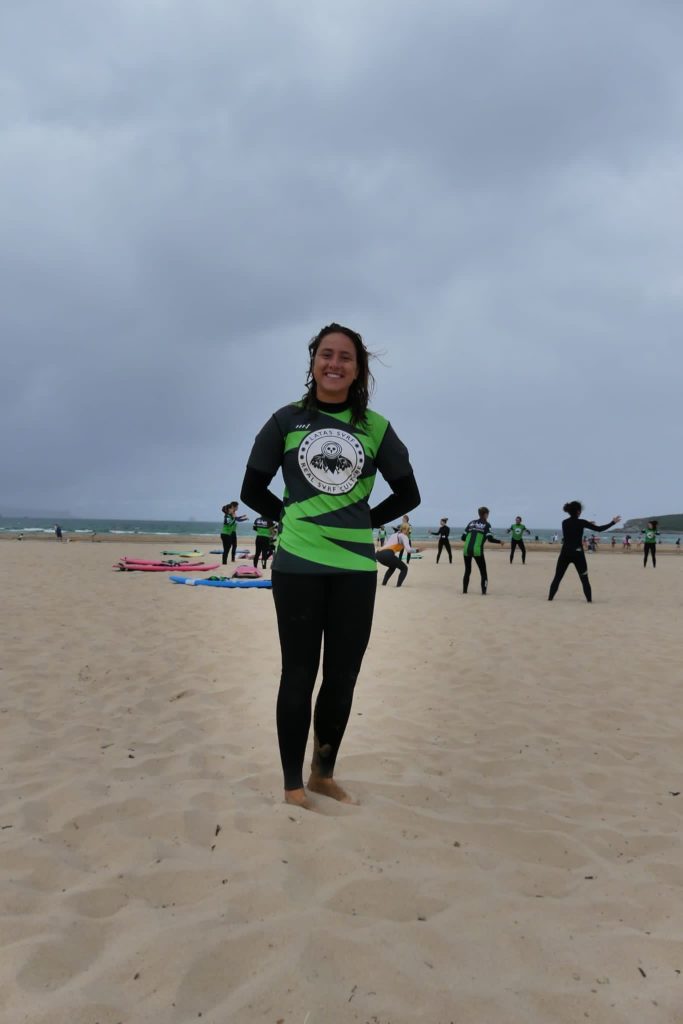
Laura loving life at Latas Surf Camp, Spain
How much can you earn as a surf coach?
Dylan: It varies from place to place. At the Wave I earn £10.50/hour but you get paid the whole shift, including your breaks. I’m guaranteed a minimum of 28hrs per week which is nice and just about enough to live of and I can take extra shifts on top of this. As long as it’s enough to live I’m happy! I’ve been in much better paid jobs and been much less satisfied than I am as a surf coach.
Laura: Where I work in Spain I’m earning a little more than € 1000/month, this comes with a very cheap price for food and accommodation. This can vary a lot from school to school and depending on the country.
Esmee: It depends where you are working. I get €15/hour
Miranda: Down in Newquay we earn £40 per lesson, so it’s a pretty decent summer job!
Eva: In Lanzarote I made €1000 for a month, it covered my flight ticket and food, accommodation was included. In Maldives it was a volunteer job, I had 3 meals and accommodation. In Portugal it was 50-50 and I had all day food and accommodation.
Jimmy: On regular lessons I get paid €25 that is either for 1,5 or 2 hours. I also run the ‘surf & action camps’ where kids get dropped of in the morning and picked up late afternoon and that pays €140 a day which is a great deal and such easy work. I’ve got the feeling that the more fun the country is, the less you get paid (so I get paid a fair amount in Holland haha!) I think that you are able to get really good deals as a surf coach in Europe or maybe Australia especially if you keep in mind that you don’t need to study for multiple years to become a instructor.
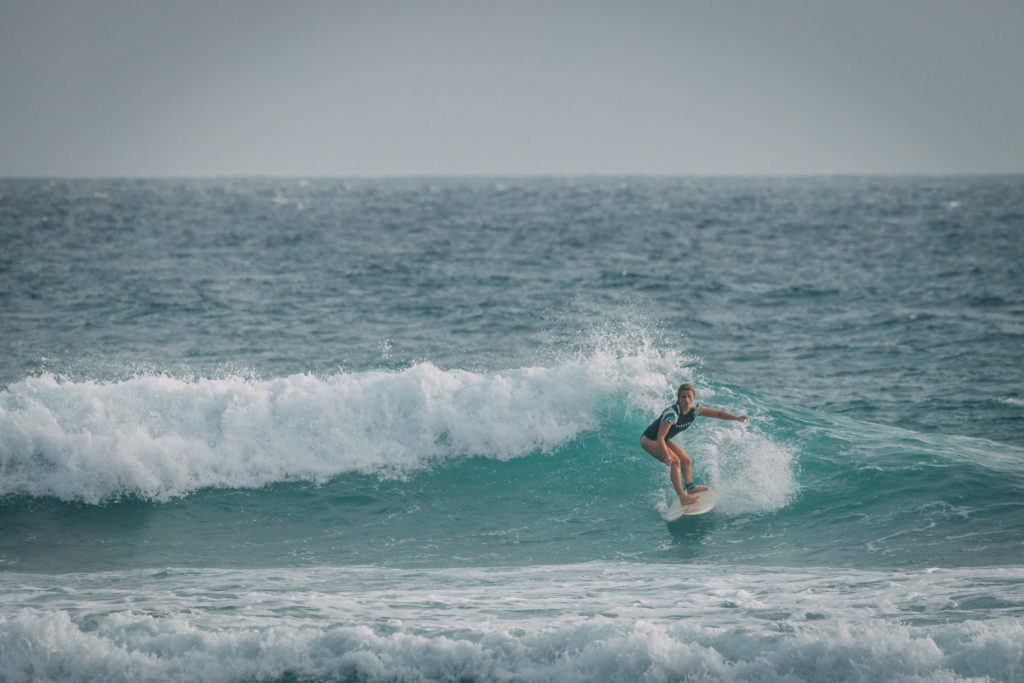
Miranda tearing it up on the 10 week trip in Sri Lanka
How many surf schools did you apply to before getting your job?
Dylan: I didn’t apply for any other surf schools. I knew I really wanted to work here as Bristol is where I’m based and my family is. I really put all my eggs in this basket and did everything I could to get this job. Very kindly from you guys I knew there was the potential to do some lessons in Cornwall so that was a nice back up and took the pressure off a little.
Laura: This was the first one to get back to me so not many. I did contact 3 other schools that didn’t have availability at the time though.
Esmee: I applied only to Ripstar. Filled in the online form and the next day I received an email to call the manager. Once call later and I had the job, on terms I got the whole certification before the camp started.
Miranda: Not many because I built up a good rapport with TTR in Sri Lanka and did a few lessons out there so they already trusted and valued me as a worker. But you can apply to as many as you like because coaches are always needed in the summer!
Eva: I applied to many schools randomly, I figured out some countries and emailed my CV and plans. Some schools respond, some do not respond.
Jimmy: None!
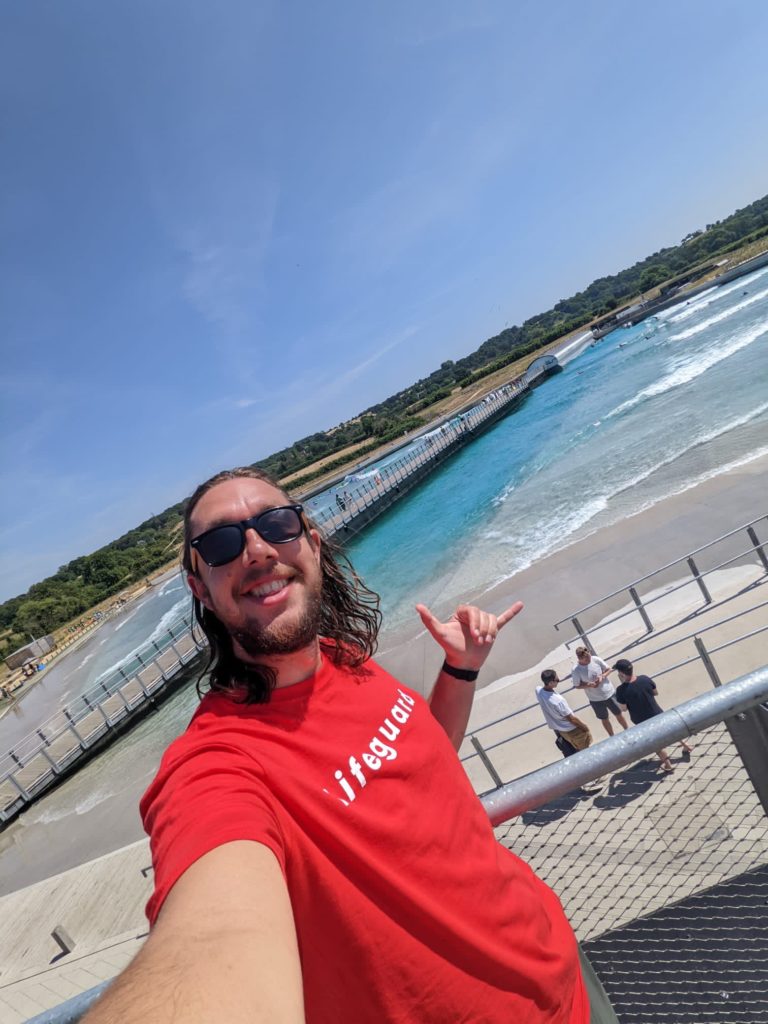
Dylan stoked after securing his dream job at The Wave, Bristol!
What’s the best bit about being a surf coach?
Dylan: Hard question as there are so many good bits! The people you work with (those learning to surf) are great. I trained as a teacher previously so that moment when they get it and it just clicks for them is so rewarding. When you can spark someone’s interest in surfing and can tell they will keep doing it throughout their life is the best bit for me. The other best bit is being in an environment you want to be in. I’ve always loved to travel and surfing is my favourite sport. Having shared interests with the people you work with helps creates great friendships.
Esmee: Personally I think the best part is the kids getting stoked about surfing and the huge joy and big smiles on their faces when they improve. And of course the nice surf vibes and you meet a lot of people with the same mindset!
Miranda: Seeing people stoked as they catch their first ever wave and I always come away feeling fulfilled and like I’ve achieved something.
Eva: I have been a teacher in the sports industry for 26 years so that is my life. To see the feeling when your students catch a wave is breath-taking, especially when your students are kids.
Jimmy: The very best bit would be that you’re able to go surf as soon as you have a empty time frame but it is also really rewarding to see the smiles when they are having fun while surfing.
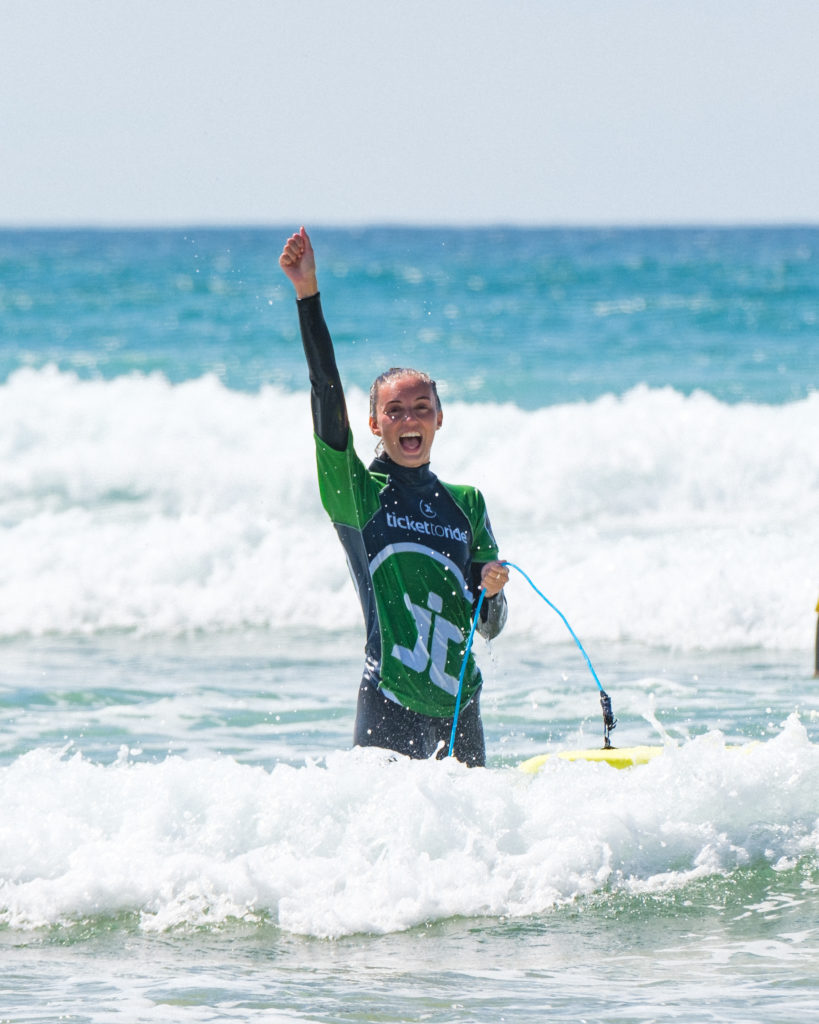
The surf stoke is real!
Any advice for someone thinking of training to be a surf coach?
Dylan: If you’re thinking of doing it, it’s probably because you have a passion for surfing. And if you have a passion for anything, I’d always say go for it! I personally was worried about my surf ability so I put myself in the position to pass with the Ticket to Ride Sri Lanka trip. It was the best possible opportunity to improve and get to the standard you need so thank you to all the team! If it’s a dream go for it, and find a way to make it happen.
Miranda: If you love being in the water and outdoors go for it. Even if you don’t use it full time, it’s a great qualification to have and a super fun and active job.
Eva: Be patient, be funny and never give up.
Jimmy: Drop everything and go for it!
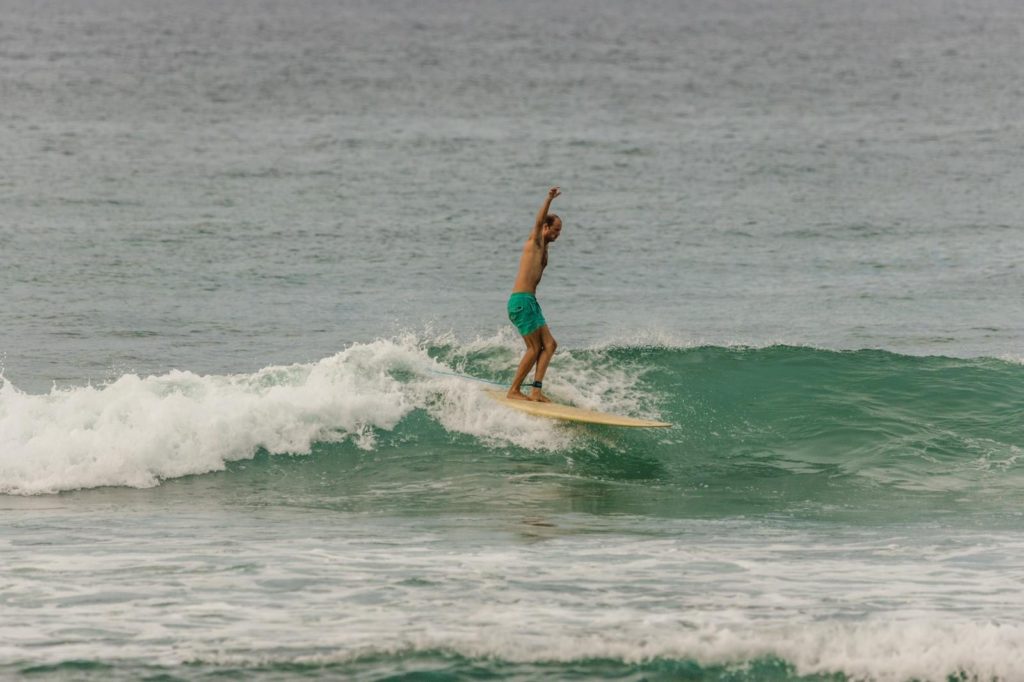
Jimmy cruising in some tropical waters in Sri Lanka
If you’re looking to gain an international qualification, make lifelong friends, improve your surfing and make the beach your workplace, why not check out our surf instructor courses and get your journey started!
South Africa Surf Instructor Courses
Sri Lanka Surf Instructor Courses
Feel free to contact a member of our team to chat more!
WhatsApp: +44(0)208 788 8668
Email: [email protected]